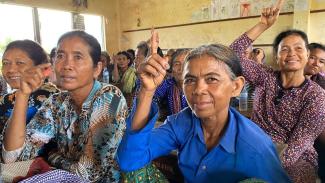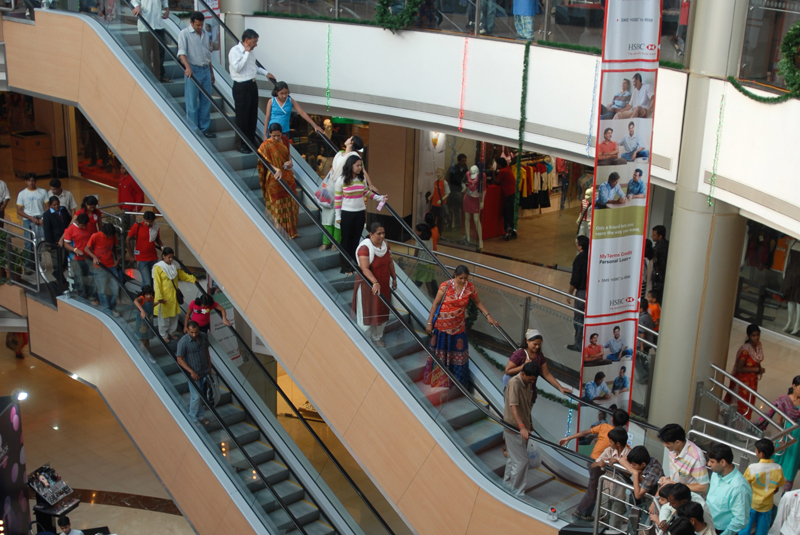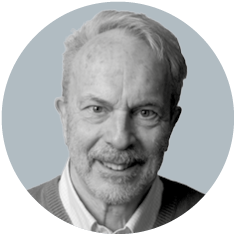Senior citizens
A mobilising force

HelpAge Germany was established in 2005 in Osnabrück and is currently active in 89 countries. Working with around 160 partner organisations, it supports and promotes self-governing associations of the elderly in Asia, Africa and South America. Most of those organisations are called Older People’s Associations (OPAs) – for example in Cambodia, China, Nepal, India and Sri Lanka. Some go by different names, such as the International Self-Help Club Vietnam (ISHC), Kwa Wazee (For All Older People) Tanzania, or Waman Wasi (The Old Wise Men) Peru.
In line with their founding principle, OPAs define themselves as groups of older people working to help their members by organising social activities, providing microfinance or engaging in other charitable activities. They also promote information-sharing and peer support. Each of these groups consists of 30 to 50 members. The first OPA was founded by HelpAge in Cambodia in 1998 with a specific mission to help older people in the aftermath of the civil war.
The idea is to strengthen civil society from within, without imposing a framework for action from outside. OPAs are particularly active in the following areas, with the first two bullets indicating the primary focus:
- health care,
- care and social security,
- income security,
- women’s empowerment,
- broader political participation and
- social and cultural activities.
The OPA model spread rapidly in South East Asia. Its underlying design is flexible, not rigid. Organisational structures and working methods differ from country to country and can be tailored to local requirements.
When developing a new OPA, HelpAge draws on experiences made in Vietnam. It generally takes two years before an OPA is fully operational and financially independent. An average of around $ 10,000 start-up funding is required to enable it to refinance itself from members’ contributions. Money that is not urgently needed for ongoing activities is invested in savings associations. Those savings prove valuable at a later time – for example, if a member needs an expensive operation, but cannot meet the costs. Well-funded self-help groups have proven effective in complementing overburdened medical care provided by government agencies in countries with underdeveloped health-care systems. However, OPAs must not develop into “substitute health authorities” in countries of the Global South.
OPAs’ success depends essentially on four key interlocking factors:
- standardisation of operation,
- political support from the state,
- replicability of processes and
- further development/strengthening of processes.
Older People’s Associations were very quickly recognised to be a mechanism for social protection in Asia and they were promoted accordingly. Since 2011, for example, the Association of South East Asian Nations (ASEAN) has included OPAs as a meaningful instrument in its Strategic Framework for Social Welfare and Development.
China included OPAs in its 12th Five-Year Plan. Cambodia has approved National Guidelines for the Establishment of Older Persons’ Associations and adopted a guideline for establishing one OPA in every municipality.
In the Philippines, the Department of Social Welfare and Development has facilitated the formation of Older People’s Associations in all cities and municipalities. In Vietnam, OPAs are included in the National Action Programme on Ageing that targets creating 5,000 clubs by the end of 2020. It is anticipated that this target will be reached.
The World Health Organization (WHO) hails OPAs as an “innovative approach” to “actively promote general well-being and ensure the participation of the socially weak and disabled in society”. They are thus considered to be a major asset for the WHO’s Decade of Healthy Ageing (WHO, 2015).
The UN Population Fund (UNFPA) recommends Older People’s Associations as an important tool for meeting the challenges of demographic change and advancing the intergenerational approach to achieving the Sustainable Development Goals (SDGs): “Governments must ensure that people of all ages can lead a healthy, active and fulfilling life. It is therefore no longer enough just to meet the expectations and needs of the older population; a more comprehensive life-cycle approach is needed to address their impact on all population groups.”
OPAs are a recognised partner in development cooperation. In Zanzibar, for instance, an OPA successfully launched a social pension for all its members. What started out in a mere two villages is now to be spread out to cover the entire nation of Tanzania. Neighbouring countries such as Uganda, Malawi, Zambia and Kenya are also interested in this form of pension payment and plan to incorporate it into their own national law.
In Peru, indigenous OPAs are working at local level handing down traditional knowledge in school classrooms. That knowledge is considered to be culturally and historically important. It figures in the national school curriculum and is now taught by trained OPA members.
OPAs have been particularly successful in Thailand. Starting out as grassroots organisations, they now have national influence. Thanks to intensive lobbying, all draft legislation must be reviewed prior to parliamentary approval to ensure that, in line with the “leave no one behind” slogan, neither older people nor people with disabilities are disadvantaged by new laws.
What starts “small” at the local level can eventually have a “big” impact at the national level. Older People’s Associations play an important role in helping to create locally anchored self-help groups and strong self-government.
Link
WHO, 2015: World report on ageing and health.
https://www.who.int/life-course/publications/2015-ageing-report/en/
Jürgen Focke is Senior Advisor for Policy & Advocacy at HelpAge in Germany.
focke@helpage.de









